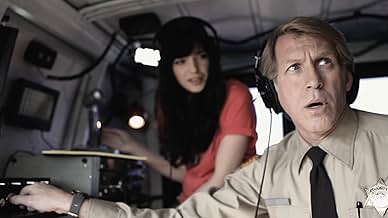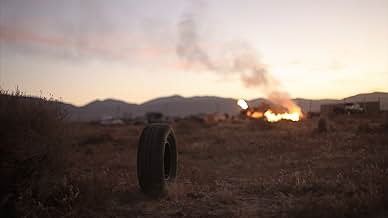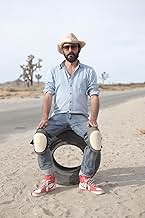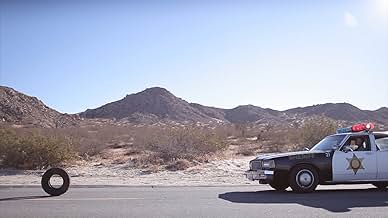Um pneumático homicida de carro, descobrindo que tem um poder destrutivo, coloca seus olhos em uma aldeia deserta quando uma mulher misteriosa se torna sua obsessão.Um pneumático homicida de carro, descobrindo que tem um poder destrutivo, coloca seus olhos em uma aldeia deserta quando uma mulher misteriosa se torna sua obsessão.Um pneumático homicida de carro, descobrindo que tem um poder destrutivo, coloca seus olhos em uma aldeia deserta quando uma mulher misteriosa se torna sua obsessão.
- Prêmios
- 5 vitórias e 3 indicações no total
- Black Woman
- (as Cecilia Antoinette)
- Zach
- (as Remi Thorne)
- Cleaning Lady
- (as Tara O'Brien)
- Cop Luke
- (as Pete Di Cecco)
- Cop Denise
- (as Courtenay K. Taylor)
Avaliações em destaque
Unfortunately, 'Rubber' succeeds in both: the only saving grace in terms of acting is Wings Hauser, the other leads make you seriously ponder an early leave. And what's with the pompous speeches? To be sure, 'Rubber' is not about taking you out or into a moment. It's about constantly reminding you that this moment isn't really happening. For some, that might be a nice existentialist twist. For others, like me, such ambition is completely out of place in a film about a tire blowing people's heads up.
If you'd edit this down to five minutes, you'd get a seriously hilarious short, though.
As for more rewarding options in the 'weird French horror film with excellent cinematography' section, I suggest 'Amer' (2009). It's equally pointless but delightful eye-candy (in the literal sense of the word).
4.5/10
Rubber is a "horror" film about a black rubber car tyre that kills people by making their heads explode. With telepathy. And when I say "horror" I do of course mean "side-splittingly funny, pitch black, absurdist comedy." The opening scenes of Rubber are a deliberate assault on the separation between the audience and the film. Normally the opening sequence of a film seeks to bring you into the world of the film; the audience is encouraged to step through the silver screen and forget about the real world for the duration of the story. Rubber perverts these expectations. The film comes crashing through the screen, into the world of the audience. It reminds us at every turn that we are watching a film, and indeed that the very act of our watching is what makes the film happen.
There are actually two plot lines at work in Rubber. The first concerns a murderous inanimate object , an innocent but spirited young woman on the run from some troubled element of her past, and the county sheriff on the trail of the vulcanised psychopath. This is ostensibly the core thread of the movie, but we soon see that this action only serves as a literal distraction for the audience, who exist in the film, embodied as actual participants, though ones who remain clearly and distinctly removed from the action, watching events at a distance through field glasses. This distraction covers the real story, that of the sheriff, who is in fact the antagonist of the story, attempting to kill off the audience (through the manoeuvrings of his toady, The Accountant) so that the film can end and he can go home.
The movie within the movie begins with a sequence that could have come straight from Leone's scrapbook. A man lies face down in a desert. Slowly, he rises, and shakes himself off. He staggers along, and falls. He rises again, and continues to stagger on, through the endless desert. Except that the "man" in question is a rubber tyre (Roger, according to the credits). This is the brilliance of Rubber; that it can appropriate the cinematic language that we are so familiar with, and apply it to situations that cannot be anything but utterly absurd.
Other scenes lift from a variety of sources, including a sequence that takes place in what is clearly the Bates hotel from the original Psycho. For a film that claims to be dedicated to meaninglessness, it is ironic that not a single frame is without a clear purpose. Every shot serves to either ensconce us in the impossible world of a rubber tyre who murders people, or tear us forcibly out of it, as we return repeatedly to the plight of the poor audience, stranded in the desert with no food, and prey to depredations of a murderous cast member, or possibly character. It's never clear whether the antagonist is an actor who wants to stop playing his role, or a character in a story who wants the story itself to end; the latter appeals, if only for its deeply apocalyptic subtext. When the film ends, where does the character go?).
Even the choice of the supposed villain must have taken a great deal of thought. It's such an elegant choice; an object capable of locomotion, but without moving parts to cutely animate. Something that has an element of menace (after all, a tyre, attached to a vehicle, can do a lot of damage), but is also innately ridiculous. An object that can fulfill the emotive needs of the film yet has remarkably little capacity to emote. Consider that all this thing can do is roll forward, roll backwards, fall over, stand up, and vibrate its sides. That's a sum total of five things you can ask your star to do for you on screen. As a film-making challenge alone, that's a spectacular feat to undertake.
I could go on for days about the tiniest of "seemingly irrelevant but incredibly well thought out" details that litter the film. That Rubber invites such complex readings is a testament to the subtlety that underlies the simple brilliance of the film itself. Whatever you may think about the subtext and meaning of this supposedly meaningless film, it doesn't really matter if Rubber "means" anything or not, because whatever else it may be, the film is absolutely hilarious. We are talking literal "tears of laughter" funny here.
Quentin Dupieux provides us with excellent cinematography, full of lingering establishing shots and vivid, often deliberately off-frame close-ups, and the cast all turn in magnificent performances, especially Jack Plotnick, who demonstrates the ability to carry a scene from laugh out loud funny to deeply uncomfortable in a matter of seconds. The script is tightly written, and the humour builds on itself in layers, rising from the initial "WTF?" moments of nervous laughter to the farcical crescendo of the closing scenes, where every element of the film collides in a scene that, if nothing else, will mean that I'll never look at tricycles the same way again.
I could continue to pick at Rubber, pulling out detail after detail, examining each one in turn to find new facets, new thoughts and revelations. None of that really matters though; what you need to know is that Rubber is the strangest, funniest, and most dazzlingly original film you will see this year, and considering that Scott Pilgrim vs The World just came out, that's one hell of an achievement.
Originally from http://www.rgbfilter.com/?p=9032
Why do people hate this film? No reason.
Why do people love this film? No reason.
Why did they make this film? No reason.
Why did we all watch this film? No reason.
Why do we want to watch this film again? No reason.
Why haven't they make a sequel? No reason.
Why would we watch that sequel if it was made? No reason.
Why is the tyre called Robert? Watch until the very end of the film to find out...
The premise of Rubber is interesting, but does not carry the whole film. There are only so many times I can watch a tire roll around from different angles and explode heads, after which point it becomes excessive, gory and just plain boring. Films of course should convey a message, but they are at their heart entertainment. If you can't engage your audience (why are we watching a film based on no reason?) and we have no characters to become invested in, the film isn't good.
If we take Rubber as a discussion of Hollywood movies and mass media in general, how they are mindless, violent for no reason and feed on their audiences, continuing as long someone is watching (reality TV/blockbusters) and as time goes on becomes destructive and inane, that is an incredibly interesting topic to deal with and thats the worst part. Rubber could have been an incredibly interesting film, but instead it relied on poor acting, poor dialogue and constantly shoving metaphor and absurdity in our face. There is no subtlety at all. We are constantly told the film is pointless, not real etc etc. So why are we watching? The film hates movies, hates its audience which it poisons for being interested. Its so cynical you are left wondering, if cinema is so bad, instead of complaining about it, why don't they just make a good film?
Você sabia?
- CuriosidadesMade mostly with practical special effects - very little CGI was used.
- Erros de gravaçãoWhen the tire is watching Nascar on the TV, the sound we hear is from a different series of motor-racing; possibly Formula 1.
- Citações
[first lines]
Lieutenant Chad: In the Steven Spielberg movie "E.T.," why is the alien brown? No reason. In "Love Story," why do the two characters fall madly in love with each other? No reason. In Oliver Stone's "JFK," why is the President suddenly assassinated by some stranger? No reason. In the excellent "Chain Saw Massacre" by Tobe Hooper, why don't we ever see the characters go to the bathroom or wash their hands like people do in real life? Absolutely no reason. Worse, in "The Pianist" by Polanski, how come this guy has to hide and live like a bum when he plays the piano so well? Once again the answer is, no reason. I could go on for hours with more examples. The list is endless. You probably never gave it a thought, but all great films, without exception, contain an important element of no reason. And you know why? Because life itself is filled with no reason. Why can't we see the air all around us? No reason. Why are we always thinking? No reason. Why do some people love sausages and other people hate sausages? No fuckin' reason.
Cop Xavier: [honks the horn] Come on! Don't waste your time explaining that garbage. Let's go!
Lieutenant Chad: Just a minute. Let me finish.
[looks back at the audience]
Lieutenant Chad: Ladies, gentlemen, the film you are about to see today is an homage to the "no reason" - that most powerful element of style.
[pours his glass of water on the ground before getting back into the trunk of the police car]
- Cenas durante ou pós-créditosDuring the closing credits, the opening monologue by Lt. Chad is shown from a different angle that shows the speech is for the "in-film" audience, and not the "theater" film audience.
- ConexõesFeatured in Trailer Failure: Rubber, Madea, Shotgun (2011)
- Trilhas sonorasJust Don't Want To Be Lonely
Lyrics and music by Vinnie Barrett, John C Jr Freeman and Bobby Eli
Performed by Blue Magic
Principais escolhas
- How long is Rubber?Fornecido pela Alexa
Detalhes
- Data de lançamento
- País de origem
- Central de atendimento oficial
- Idioma
- Também conhecido como
- Rubber: La llanta asesina
- Locações de filme
- Four Aces Movie Ranch - 14499 E Ave Q, Palmdale, Califórnia, EUA(Sheila's car stalled, tire bumped by pickup truck)
- Empresas de produção
- Consulte mais créditos da empresa na IMDbPro
Bilheteria
- Orçamento
- US$ 500.000 (estimativa)
- Faturamento bruto nos EUA e Canadá
- US$ 100.370
- Fim de semana de estreia nos EUA e Canadá
- US$ 16.346
- 3 de abr. de 2011
- Faturamento bruto mundial
- US$ 101.729
- Tempo de duração1 hora 22 minutos
- Cor
- Mixagem de som
- Proporção
- 1.85 : 1
Contribua para esta página



































